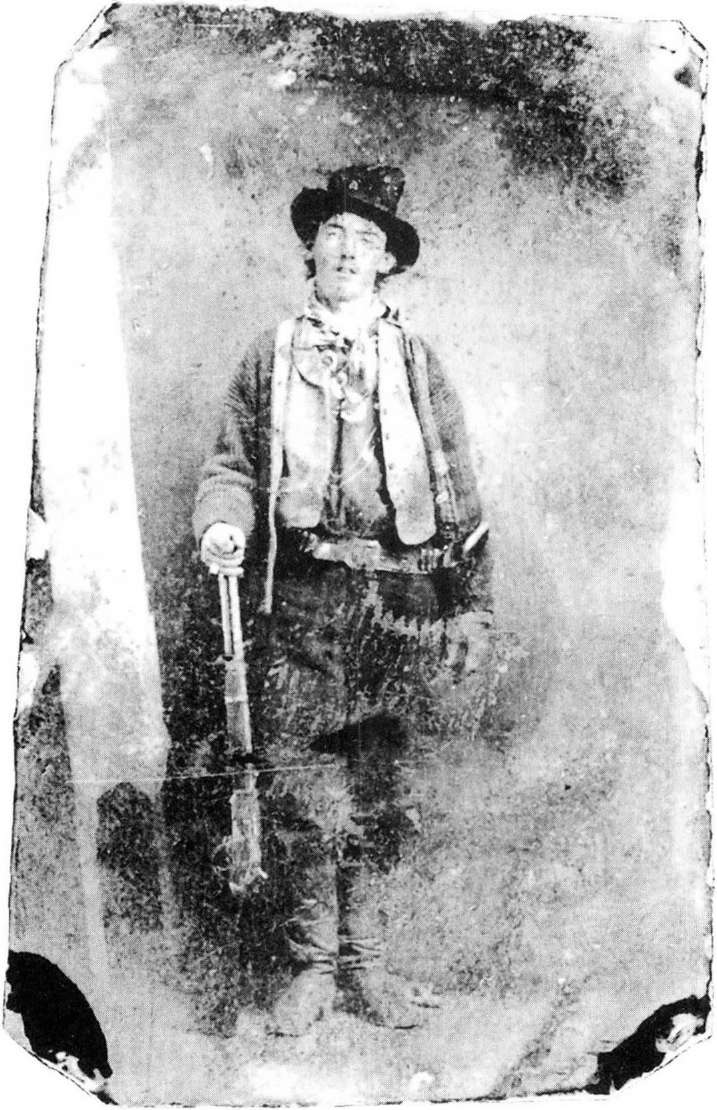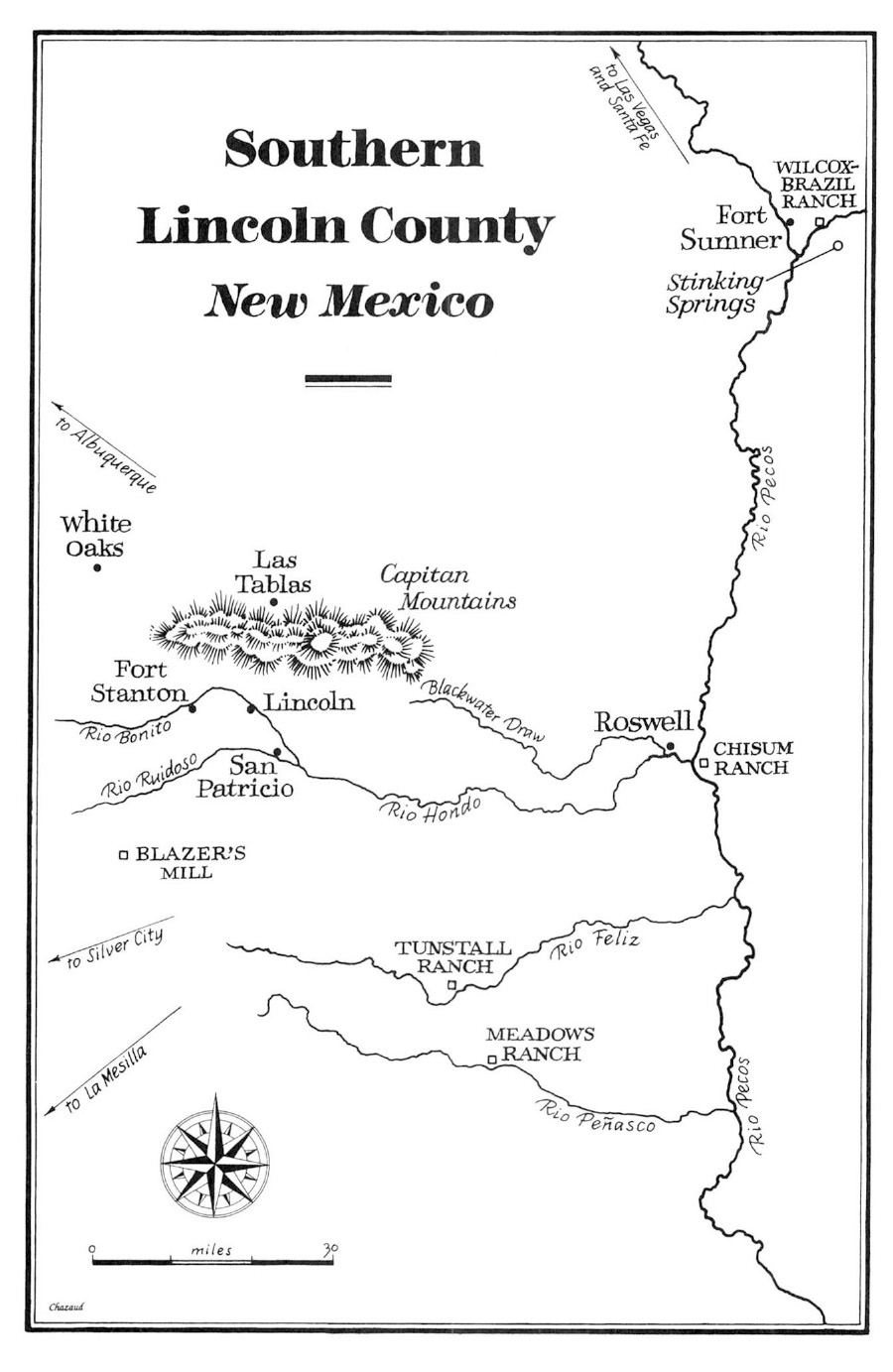Lucky Billy
Authors: John Vernon

 
For A
NN
,
and in memory of
P
ATRICIA
W
ILCOX
Copyright © 2008 by John Vernon
ALL RIGHTS RESERVED
For information about permission to reproduce selections from
this book, write to Permissions, Houghton Mifflin Company,
215 Park Avenue South, New York, New York 10003.
Library of Congress Cataloging-in-Publication Data
Vernon, John, date.
Lucky Billy / John Vernon.
p. cm.
ISBN: 978-0-547-07423-8
1. Billy, the KidâFiction. 2. OutlawsâFiction.
3. Southwest, NewâFiction. I. Title.
PS3572.E76L83 2008
813'.54âdc22 2008017924
Printed in the United States of America
Book design by Victoria Hartman
Map by Jacques Chazaud
DOC 10 9 8 7 6 5 4 3 2 1
The tintype of Billy the Kid is reproduced courtesy of Palace of the Gover-
nors (MNM/DCA), negative number 128785.
Excerpts from the letters of John Tunstall, Robert Widenmann, and Huston
Chapman, cited from
The Life and Death of John Henry Tunstall
and
The
Lincoln County War: A Documentary History,
are used by permission of the
author, Frederick Nolan, and, acting for the family, Hilary Tunstall-Behrens.
The letter written by Lew Wallace to Billy the Kid in chapter 13 is reprinted
by permission of the Indiana Historical Society, the Wallace Collection.

T
HAT'S HIM
. They say that's his picture. The cocky little cowboy strikes a tintype pose, probably assisted by a hidden stand whose metal collar restrains him for the long exposure; you can just see its leg behind one foot. Still, he looks draggle-tailed. This may be more attitude than posture. I picture his mother propping him up with a death-grip on the back of his neck, though his hips nonetheless appear to sling forward, his arms to bow apart, his insolent mouth to slackly unhinge, as though most of him were an irrelevant sack hanging from her clenched hand. But Catherine had died in 1874, six years before this picture was taken, and a species of coat stand with one projecting pincer-arm had to substitute for her. She never saw him as we do, when we gaze at this picture, with his front teeth so prominent he could eat pumpkins through a fence, as a wag once saidâor with arching black eyebrows, sticking-out ears, scraps of black hair hanging down his neck. He surely didn't own that weaponry when she was livingâthe holstered pistol, the cartridge belt, the Winchester rifle on which his hand restsâbecause when she died he was only thirteen and he hadn't yet become Billy the Kid. The side-creased hat looks as though he's been clubbed on the head by a washboard. The sweater, though, two sizes too large, could be a hand-me-downâhe did have an older brotherâand the shirt. The shirt! On its placket just visible through his buckskin vest is what appears to be an anchor with a rope loosely coiled around its shaft, and does that not make it one of those ubiquitous sailor shirts that doting mothers used to buy for their sons? It could be the same shirt he'd worn as a boy.
The Anthony four-tube camera had a six-second exposure and produced four images, for which the Kid paid twenty-five cents. Two survived. One disappeared years ago. The other was given to the Lincoln County Heritage Trust in 1986 by the descendants of Sam Dedrick, a horse trader at Fort Sumner, New Mexico, where the picture was taken. But the Trust displayed it under bright lights, a serious blunder, and the tintype darkened, and all we have now are reproductions of a vanished original. Even the scratched and spotted surface is a copy of a scratched and spotted surface, as are the marks of the tacks on the four corners and the photographer's corrosive thumbprints at the bottom. The only known image of Billy the Kid, then, the one you are looking at, is a shadow of a ghost, a photograph of a perished tintype of a young man who perhaps had it taken in the first place to prove that he wasn't a figment of his own imagination. But what was he thinking of, to tilt his head like that and pooch out his jaw, looking every bit like Comer Pyle, thus defying our attempts to make him a figment of
ours?
He looks nothing like the Hollywood Billies, the Robert Taylors, Buster Crabbes, Paul Newmans, Kris Kristoffersons, or Emilio Estevezes.
Nothing like Billy Conlon, either, the boy who stole my three-speed Schwinn bike when I was ten years old, then had the chutzpah to offer to search for it with me and our playmates. As our posse scoured the backyards and alleys of north Cambridge, he looked up at my faceâlike his namesake, he was shortâand framed his desire to "find" what he'd taken as a thrilling adventure; this was the Wild West and we'd string up the horse thieves. For a moment, his eyes were convincingly plaintive but, slipping to the side, they lapsed into cunning. Billy Conlon, too, had an exigent mother (and a missing father), a tall, indolent syrup of womanhood who wore shoulder pads, hairnets, and high heels, and who often poured herself across her shabby couch and asked her son to scratch her back in his friends' presence. When I'd all but despaired of reclaiming my bike and lay on my bed sulking one day he brought it to my door, having found it, he said, in the marshes beside the Dewey and Almy Chemical factory where Route 2 made its swing into Boston, the same industrial wasteland at the edge of our neighborhood where he'd once tortured bullfrogs and turtles. His mother had made him return it, I guessed. And, talk about brass, he expected a reward, despite having gouged his initials on the fender!
He was always Billy the Kid in our games, for unlike the tintype Billy he looked the part: gash of black hair across his freckled forehead, fetching grin, not too big a nose, no buck teeth, close dark Irish eyes. His face was a cherub's. Yet, he'd set his room on fire; he'd forced his sister Nancy to drink range oil and eat an entire package of Ex-Lax; he would fight anyone at the drop of a dime. And later, when I'd finished college and had begun writing novels, I heard that he'd stabbed a man on the street, viciously killing him, exactly as the first Billy was said by his nemesis and friend Pat Garrett to have done (because the man verbally abused his mother). And that's when I learned to look back on my childhood as though it had become an abandoned film set, a back lot obliging my fond inclination to sentimentalize bad behavior. Or a discarded comic book, or a Big Little storybook, for I read everything then, I even read torn newspapers on the street and labels of cans of peaches in the store, and pictured myself as an extra in the story that the Billies of the world acted out in books and movies.
Most longings fizzle. The point about Billy was he always died young. He did not have to make emotional adjustments, watch his language, rearrange his priorities, wonder what was stirring inside him, be punctual or dignified, harbor guarded intentions, or care what people thought of him. Those of us who color inside the lines and wash our hands before eating and finish our vegetables and floss and remain faithful to our spousesâwe nice, regular people who shrink existence to the size of a nutshell and live out our biblical three score and ten with diminishing zealâwhere would we be without him?

Escape
H
ELLO, BOB
."
Bob Olinger looks up at Billy in the window and freezes on the spot. He's a large man of vinegar aspect, a burly, dumb, squint-eyed giant with red hair, curiously infantile features, meaty hands, reeking breath, and, the Kid knows, a heart of pure lead. Two years ago he murdered Billy's old friend John Jones by shaking Jones's right hand with his left and squeezing it tight, which prevented Jones from drawing, and shooting him cold. Now he's a deputy sheriff in Lincoln. There's just no keeping some men down. For the record, his first name is not Bob but Ameredith, inflicted on him by a patriotic mother who wanted a girl. It was only yesterday that Bob had told the Kid he had no more chance of escaping under
his
guard than of going to heaven. Thanks for the
aviso,
Bob. From his perch in the window, Billy spots the prisoners Bob had escorted to the Wortley Hotel across the street watching from the hotel grounds. They won't flee, he knows, even after Bob's killed, for unlike the Kid they are trustees, they've even been allowed to wear their weapons at the courthouse, since their acquittal is all but assured. No court in New Mexico will convict five men for killing four others who'd fired on them first in a dispute over precious water rightsânot when the accused men's alfalfa fields needed irrigation. They're being held at the courthouse in the room still referred to as Mrs. Lloyd's room, named for Lawrence Murphy's former housekeeper. And Billy's being held, or was long enough for him to savor the irony, in the late Lawrence Murphy's bedroom, for the Lincoln County Courthouse not that long ago was the Murphy-Dolan store, headquarters of the Irish ring against which he'd fought for the last four years. They'd started this mess. They'd killed John Tunstall. Dolan and his crew had once disarmed the Kid right here in the store and made him eat crow, and now look at him! It
was
the only two-story building in Lincoln, that's why he can look down at poor Bob for a change instead of the latter toploftily sizing up his famous prisoner shackled to the floor before kicking his slats, as he'd done every morning for the past seven days when it was wake-up time.
Yesterday, when Sheriff Garrett left for White Oaks to order up the wood for the Kid's gallows, he'd double-checked Billy's shackles, called his deputies in, Olinger and Jim Bell, and warned them to be especially vigilant. If he's shown the slightest chance, if he's even allowed the use of one hand, if he's not watched at every moment, he'll effect some plan to murder the both of you and escape. Lip-labor, said Bob after Garrett left. The sheriff ought to save his spit. Bob's response to his boss's absence was to gloat over Billy, to taunt him all the more. Wake up, dearie, potty-time, dearie, can I get you something, dearie? The Kid in turn had greeted the two deputies at breakfast that morning,
Ameredith
and the more pleasant Jim Bell, with a cheerful "Morning, girls." They passed the time by playing poker in the sheriff's office. "I never did enjoy killing a person," Bob said as he dealt.
"I did."
"But I'd love to kill you. It would give me great pleasure."
"Is that so."
Bob poured himself his first midday whiskey. Usually when the bottle was half drunk he offered Jim some. And Jim in turn, if Olinger had to use the privy, would wait until Bob had left the room and, clue to the short chain on the Kid's manacles, hold the bottle to his mouth. Is there kindness in hell? Jim asked Bob, "What do you mean you never did enjoy it?"
